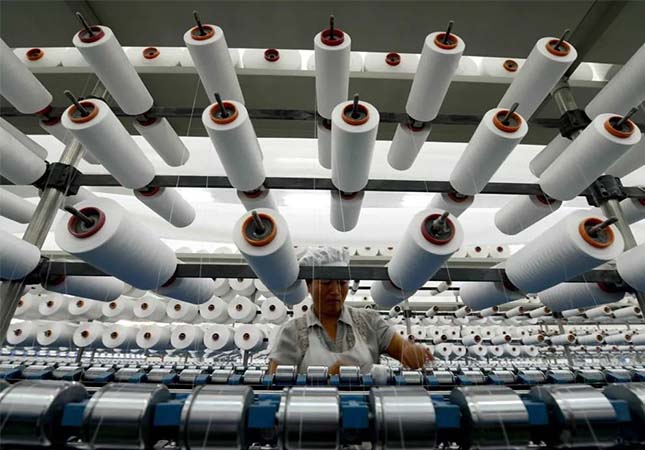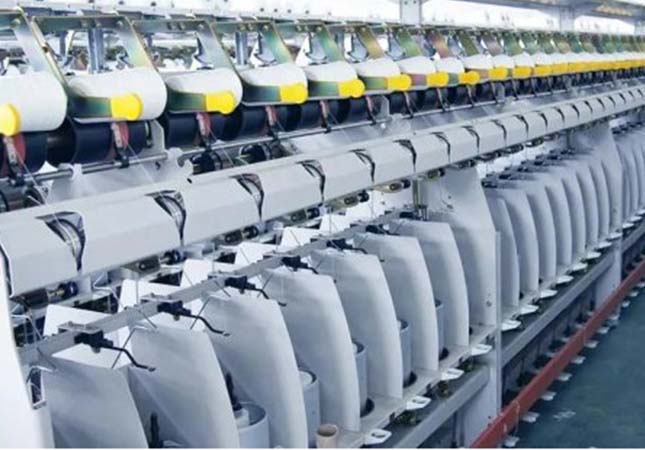Textile machinery provides various benefits that are essential for textile manufacturers to meet their production requirements, achieve high-quality products, and stay competitive in the market. However, with the fast changes in modern society, the requirements for production would be higher and there will be more challenges and chances in the future world, the intelligence of the textile machinery could help the manufacturers to come over the challenges and catch the chances.

What Textile Machinery Providing
1. Increased Productivity
Automated machinery can handle tasks with high precision and speed, reducing human errors and increasing output. Textile machineries such as spinning machines, weaving machines, knitting machines, and dyeing machines are capable of producing large volumes of textiles in a relatively short period of time, leading to higher productivity levels and improved production efficiency.
2. Improved Quality
Advanced technologies such as computerized control systems, sensors, and monitoring devices are used in textile machinery to maintain optimal process parameters such as temperature, humidity, tension, and speed, leading to improved product quality. Additionally, textile machinery can perform tasks such as fabric inspection, color matching, and quality control with high precision, resulting in textiles with a consistent color, pattern, and finish.
3. Cost-effective Production
Textile machinery enables manufacturers to achieve cost-effective production by reducing labor costs, minimizing material wastage, and optimizing production processes. Automated machinery requires less labor compared to manual processes, leading to reduced labor costs. Textile machinery is also designed to minimize material wastage through precise cutting, dyeing, and finishing processes, leading to cost savings in raw material consumption. Furthermore, advanced technologies such as predictive maintenance, real-time monitoring, and data-driven decision-making in textile machinery enable manufacturers to optimize production processes, reduce downtime, and minimize production costs.
4. Innovation and Customization
Textile machinery is constantly evolving, driven by technological advancements and market demands, leading to innovation and customization in textile production. Textile machinery manufacturers are constantly developing new technologies and features to improve textile production processes, enhance product quality, and meet changing customer preferences. Customized textile machinery allows manufacturers to tailor their production processes to meet specific requirements, such as producing textiles with unique patterns, designs, or functionalities.
5. Sustainable Production
Green technologies such as water-saving technologies, energy-efficient processes, and eco-friendly materials are being integrated into textile machinery to minimize the use of resources, reduce waste generation, and promote sustainable production practices. 6. Enhanced Flexibility
Textile machinery provides manufacturers with enhanced flexibility in production processes. Advanced textile machinery allows for quick and easy changes in production parameters such as fabric type, color, design, and size, enabling manufacturers to meet changing market demands and customer preferences. Flexible production processes also enable manufacturers to respond to short-term orders, reduce lead times, and improve customer satisfaction.
6. Improved Worker Safety
Automated machinery reduces the need for manual handling of heavy materials, leading to a reduced risk of injuries. Textile machinery is also equipped with safety devices such as emergency stop buttons, sensors, and guards to protect workers from potential hazards during the production.

Intelligence Trends of the Textile Machinery
The following is about the intelligence trends of textile machinery, which are shaping the present and future of the industry.
1. Automation and Robotics
Automation and robotics are transforming the textile machinery industry, revolutionizing the way textiles are manufactured. Automated textile machinery systems are designed to perform repetitive tasks with precision and accuracy, resulting in higher productivity, reduced labor costs, and improved quality control. Robotics and automation technologies are being used in various textile processes such as spinning, weaving, knitting, dyeing, printing, cutting, and finishing, among others. Advanced robotics and automation solutions are capable of handling complex tasks, such as fabric handling, pattern recognition, and quality inspection, with minimal human intervention, leading to increased efficiency, speed, and consistency in textile production.
2. Internet of Things (IoT) and Industry 4.0
The integration of IoT and Industry 4.0 concepts in textile machinery is bringing about a significant transformation in the industry. IoT enables textile machinery to be connected and communicate with each other, creating a smart network of interconnected devices that can share data, analyze information, and make autonomous decisions. This connectivity allows for real-time monitoring, remote control, predictive maintenance, and data-driven decision-making, resulting in improved operational efficiency, reduced downtime, and optimized production processes. Industry 4.0 concepts such as cyber-physical systems, big data analytics, and artificial intelligence are being integrated into textile machinery to enable self-optimizing and self-adapting production processes, leading to intelligent textile manufacturing.
3. Artificial Intelligence (AI)
AI is playing a pivotal role in the textile machinery industry, enabling machines to perform tasks that traditionally required human intelligence. AI-powered textile machinery is capable of analyzing data, learning from patterns, making predictions, and optimizing processes. AI-powered textile machinery is paving the way for intelligent, self-learning machines that can adapt to changing production requirements and continuously improve their performance.
4. Digitalization and Virtualization
Digitalization and virtualization are transforming the textile machinery industry, enabling textile manufacturers to digitize their production processes, create virtual simulations, and optimize their operations. Digitalization involves converting analog information into digital data, allowing for data-driven decision-making and remote access to information. Virtualization involves creating virtual models or simulations of textile machinery and processes to optimize production parameters, simulate production scenarios, and conduct virtual testing and validation.
5. Sustainability and Green Technologies
Green technologies, such as water-saving technologies, energy-efficient processes, and eco-friendly materials, are being integrated into textile machinery to reduce the environmental impact of textile production. Textile machinery is being designed to minimize water consumption, reduce energy usage, and optimize production processes to minimize waste generation. Sustainable textile machinery is also focused on reducing the use of harmful chemicals and improving the recyclability and biodegradability of textile products.
Conclusion
In conclusion, textile machinery provides numerous benefits to the textile industry, and as technology continues to advance, textile machinery is expected to play an increasingly pivotal role in driving the growth and sustainability of the textile industry.
As a reputable textile machinery manufacturer with a rich history in automation and intelligent manufacturing technology of textile and warehousing equipment, SUNTECH Textile Machinery possesses cutting-edge core technologies that are recognized globally.
SUNTECH’s products cover the textile manufacturing and handling process of almost fabric types, in which pinking machine, non woven machine, beam truck, meltblown machine, fabric cutting machine, motorized beam trolley, beam storage, warp tying machine are the most popular machines and material handling equipment.
SUNTECH Textile Machinery leads the textile industry with our innovation and experience! Quotes and Cooperation are Highly Welcome!




